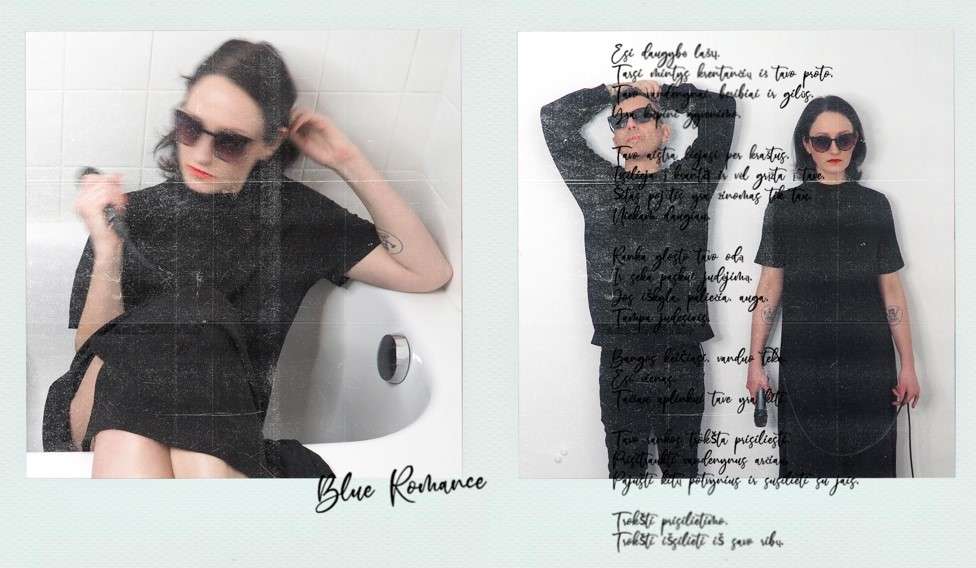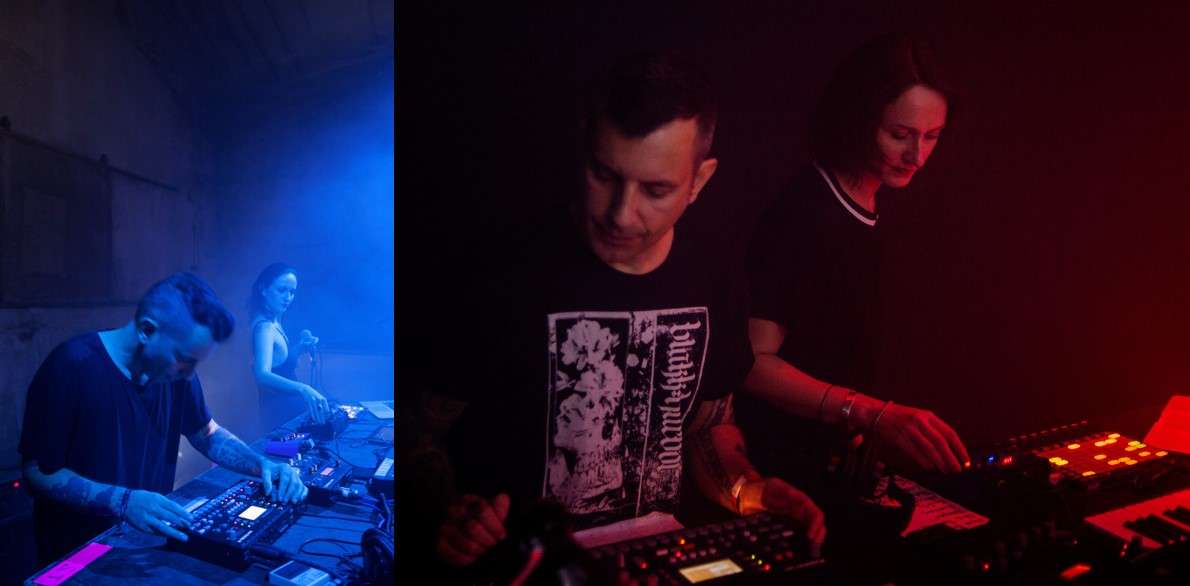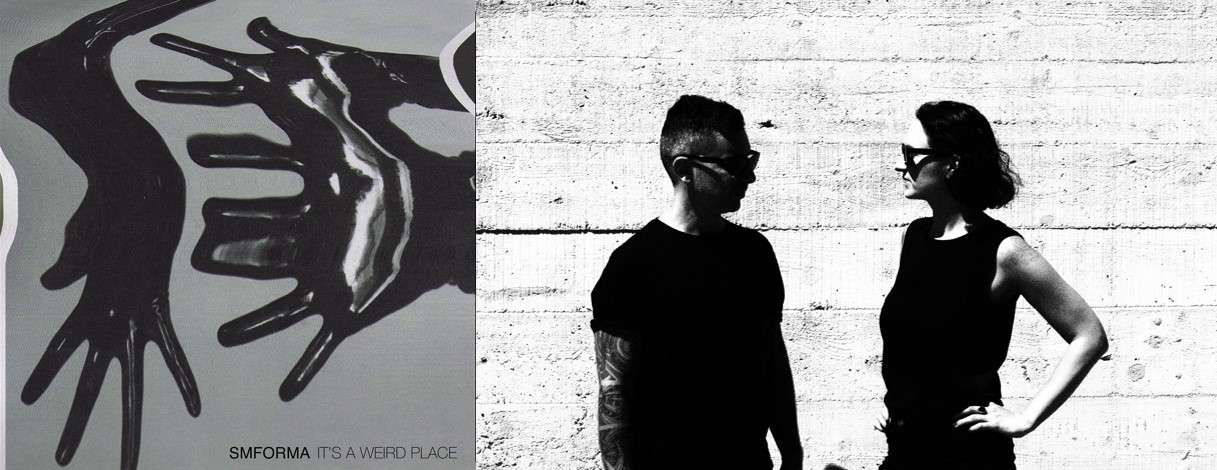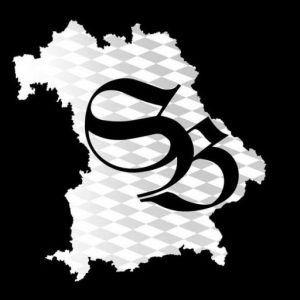SMForma ist das elektronische Musikprojekt von Mario und Jogile aus Barcelona. Ihr kraftvoller Techno-EBM-Sound ist energiegeladen, unglaublich fesselnd und wird durch den intensiven und dunklen Gesang von Jogile angetrieben. In Kürze erscheint die neue EP It‘s a weird place über Soil Records. In drei der vier hypnotischen Tracks kann bereits über Bandcamp reingehört werden. Eine weitere EP mit Remixen ist bereits in Planung. Wir sind schon sehr gespannt und freuen uns auf diese Veröffentlichung!
Who is behind SMFORMA? What made you decide to start the project?
We are two people who are united by our shared passion for music and a deep-seated desire to create something impactful together. Our journey began organically, stemming from the strong connection we formed when we first started seeing each other. Music has always been at the core of our relationship, fuelling our creativity and driving us to collaborate. From the outset, we knew that our combined musical experiences and influences had the potential to create something special. Crafting our debut record on Diffuse Reality Records between Berlin and Barcelona was a defining moment for us. Since then, our collaboration has flourished, evolving with each project and continuing to inspire us every step of the way.
Can you tell us a few things about the connection between you two and your journey into music?
Jogile: Our connection in SMFORMA is like yin and yang. Mario embodies the beats and noise, while I focus on melodies and harmonics. My journey into music began when my mother enrolled me in music school at the age of six due to my natural ear for music, leading to nine years of classical piano education that I cherish deeply. Simultaneously, I sang in the school chorus, delved into traditional Lithuanian singing, and learned to play classical guitar during my time in the school cover band that turned later into a punk-rock band. Later, I ventured into creating an avant-garde industrial-electronics project, resulting in memorable performances across Lithuania. Before leaving Lithuania, I was also involved in another synth-pop-EBM project. During my decade in Berlin, I immersed myself in music, attending countless concerts and exploring various genres like industrial, noise, power electronics, goth, EBM, ambient, experimental, and techno, finding inspiration in each experience. Thanks to a dear friend in Berlin, I had the privilege of spending countless hours with analogue equipment, immersing myself in learning and enjoyment, which deepened my passion for music. It was this experience that truly reignited my desire to create music.
Mario: As a teenager, I began spending many hours observing how friends and acquaintances produced their sound in their studios, especially to understand the more technical aspects. It wasn’t until I moved to live in London that I bought my first 303, and from then on, I started recording with my own project, D.FORMA, with a more noise and industrial sound. Upon returning to Barcelona, I became part of several projects always focused on live electronic music. In our creative process, we don’t use the computer much; we usually prepare the live performance first and then record for the album. It’s somewhat the other way around, but on a creative level, it’s much more interesting for us.

If you had to describe your music in terms of not music … what would you say?
In non-musical terms, our music is a fusion of futuristic cityscapes with the hidden beauty of secret gardens. We aim to capture this duality: the strength of metal and concrete alongside the warmth of melodies, like lights in the darkness.
What are you looking for in music? What are the boundaries that you look to explore with music?
Jogile: For me, music is all about connection. Whether I’m listening to it or creating it, there has to be that unexplainable click that resonates deep within. I seek music that speaks to my soul, igniting emotions and sparking inspiration. There are no boundaries; I’m constantly exploring new sounds, genres, and styles. Personally, it’s about going deep with performance, combining it with music to transmit that very same click that speaks to the core of my being. I prefer to break free from conventional norms and embrace the unknown.
Mario: It’s not really a search for anything, it’s a remedy, a medicine, a channel of expression that you need to channel a lot of feelings inside you. I always compare it to one who does sculpture or painting. I doubt that most people who do sculpture try to become Jaume Plensa or Botero, they do it because they need to, to express themselves and not become serial killers. I’ve never understood people who made music to become known, I don’t judge, I just don’t understand it, but it’s usually the people who leave it by the wayside. You create something just for the sake of creating it, if you also connect with thousands of people then fine, but when that’s the only objective it’s easy to get burnt out and give up. The only limitation in my case may be my technical knowledge, but limiting your expression makes no sense. Besides, I consume too many different disciplines of art, and all of them partly influence me, to ignore them.
What is sound to you?
Mario: Sound for me is my main channel of expression, I couldn’t give you a philosophical explanation about it. I have a problem with silence, I can’t stand it, in fact, I can’t sleep in absolute silence, maybe that explains my insomnia.
Jogile: To me, sound is a manifestation of energy, a medium through which vibrations travel and convey messages. It’s the audible expression of the world around us, evoking emotions, memories, and sensations through its vibrations.

What are your first musical memories? When did you first fall in love with sound?
Mario: In my case, the funny thing is that my first connection with sound isn’t something classical or musical in the traditional sense. Part of my family hails from Valencia, and we’ve frequented the city for as long as I can remember. Valencia hosts a vibrant celebration called the Fallas, featuring an event known as the mascletà. I recommend watching videos of it (LINK). My father, fascinated by pyrotechnics, would take me every year from my pram, and as I grew older, I joined Fallas groups to set off firecrackers like there was no tomorrow. When I began recording pieces and shared them with my mother, she chuckled and said, „Son, you can hear the mascletàs!“ That’s when I realised where my passion for noise originated from.
Jogile: My earliest musical memories are intertwined with the comforting melodies that filled my home from a young age. My mother would often play music as I drifted off to sleep, and the soothing sounds of the piano, played by my older sister, became a familiar backdrop to my childhood. Alongside this, I have vivid recollections of dancing and singing along to the upbeat tunes of 80s music while helping my parents with household duties on weekends. Those memories, I believe, laid the foundation for my deep connection with music.
Which person, artist or incident inspired you when you first started making music?
Mario: In addition to what I mentioned above in terms of sound, I was lucky enough in my teenage years to be surrounded by musical freaks who introduced me to a lot of music. I come from the noise side like Merzbow, Masonna, KK Null and all the Japanoise artists. I got caught up in making noise just for the sake of it, for no reason or concept, I hate concepts.
Jogile: I consider myself incredibly lucky to have been surrounded by talented and passionate music people my whole life. Music has been an integral part of my environment, providing countless inspirations along the way. From my early exposure to classical music to my immersion in the industrial scene, I’ve witnessed numerous bands and projects perform over the years. However, it was classical music that initially ignited my passion for creating music, providing me with essential skills. Industrial music, on the other hand, equipped me with tools and aesthetics that continue to inspire me to this day.
What impact do your surroundings have on your art?
Mario: Everything. I’m influenced even by advertisements in the metro. I have artistic studies and I always look at everything even if it has nothing to do with me, from magazines whose aesthetics catch my attention, the design of a bar, to a beat in a group of mainstream artists, I look at many things and I’m sure that something affects me. The good thing that time has given me is that I have fewer and fewer prejudices about art, especially music, and I like to investigate new styles.
Jogile: For instance, when we travel, we often carry a recorder to capture the unique sounds of our environment. Whether it’s the rhythmic hum of a train in Sri Lanka or the chaotic symphony of the streets in Hanoi, Vietnam, these sounds become integral elements in our creative process, influencing our compositions and adding layers of authenticity to our work.
Where does your inspiration for music come from? Which sort of mood produces the best song?
Jogile: My inspiration for music often arises from the process itself — experimenting, listening, and refining until I find something that resonates with me. It’s a journey of exploration and discovery where each attempt fuels creativity. As for the mood that produces the best song, it’s less about a specific mood and more about being in a mindset of openness and curiosity.
Mario: As I mentioned, amidst the various inputs I encounter throughout the day, sometimes a simple piece of news can put me in a foul mood, prompting me to channel it through distortion. Other times, on clearer days, I might opt for a more techno beat. I have two dedicated moments for music creation: the primary one being very early in the morning with a litre of coffee. It’s during this time that I engage in the real work — methodical, slower, and more technically focused. With SMFORMA, we love to experiment with our new tracks on a Saturday afternoon/evening and see if they work on a vampire schedule.
How does the birth of a new composition happen for you? How does your compositional process work?
Jogile: For us, the birth of a new composition typically begins with Mario generating provisional/raw track ideas or just loops. We then come together to listen, building upon these foundations by structuring, sampling, recording, and crafting melodies. It’s an organic process of experimentation and collaboration, often involving many hours in the studio that go unseen but are truly enjoyable for us.
Mario: As a default, I invest many hours in the studio, either searching for sounds or experimenting with the machines, often stumbling upon themes accidentally. A sound might inspire a melody, or a melody might inspire a beat, leading to the creation of a structure. At times, a beat may linger in my mind for days, or I might find myself recording a beat by humming into my mobile phone while out and about. We don’t adhere to a strict, methodical process; instead, it’s a matter of dedicating time in the studio. When inspiration is lacking, I might clean samples, while on more alert days, I’ll play loops in the background and experiment with melodies or backgrounds. Feeling particularly experimental, I might even string together pots and pans to see what emerges. Rarely do I sit down with a very clear idea; rather, it’s about embracing the spontaneity of the creative process.
How does the visual aspect relate to and reflect your music?
Mario: As a graphic designer, it’s a crucial aspect for me. We take pleasure in being part of the designing process of album covers and, when possible, designing flyers. Fortunately, we usually share tastes and styles, which streamlines the process. We predominantly utilise black and white, occasionally adding touches of red. Typically, we avoid incorporating visuals during live shows to prevent distractions and ensure that the audience’s attention remains on the music. However, when we’ve had the opportunity to collaborate with visual artists, we’ve been fortunate to work with talented individuals who have contributed greatly to our show.
How would you describe the world you are trying to create during your performances?
Jogile: During our performances, we strive to create a world where enjoyment, dancing, and letting things go take precedence. Personally, when I’m on stage, I disconnect entirely, sometimes even forgetting there’s an audience in front of us. Our primary goal is to have fun ourselves and convey that energy to the audience. However, I also aim to transmit a spiritual message through my lyrics, hypnotic voices, and tones, hoping to touch listeners and transport them into a state of reverie.
Mario: With SMFORMA, our aim is straightforward: to get people onto the dancefloor and ensure everyone has a great time. In the studio, if we’re not up on our feet dancing, it simply doesn’t click for us. Ultimately, we believe that people attend events to enjoy themselves, and I’m no exception. Transitioning from the realms of noise and experimental music, we found it challenging to come across live performances that only the performers themselves truly enjoyed. With SMFORMA, our goal is to create an atmosphere where everyone can come together to dance and have fun.
What’s next for you? What are you most looking forward to?
We just launched our 4-track EP Vinyl on Soil Records. We’re eager to debut these new tracks live and are also putting the finishing touches on another EP, which includes some fantastic remixes. Performing our music live and experiencing the audience’s reaction is what excites us the most.

(821)
